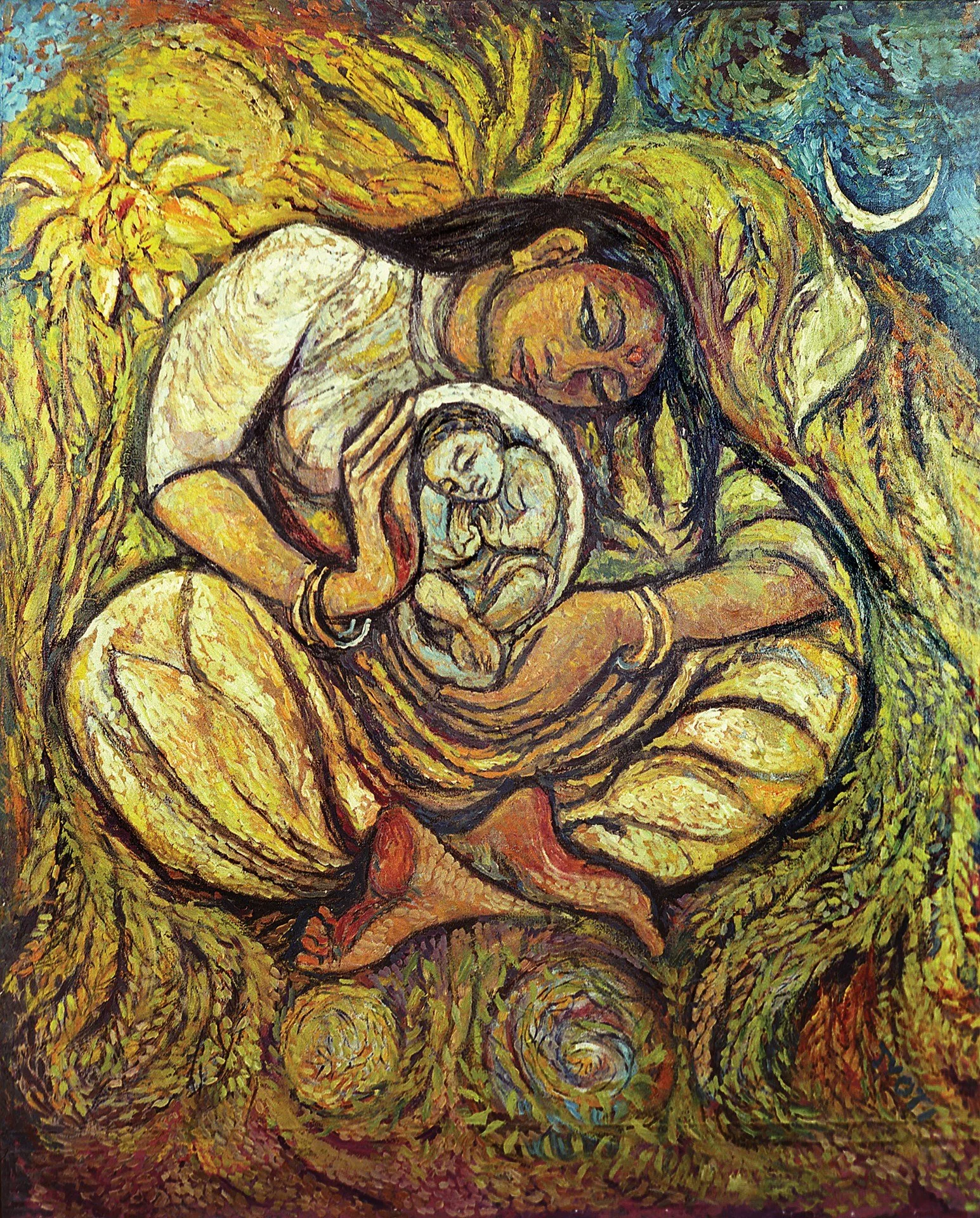
Prayer Thirty-Eight
Glory to God for the child born among us,
a gift to be nurtured and cared for,
a guest in a world of toil and tears
bringing hopefulness, life though brokenness.
May we, as on Emmaus Road, recognise him still
in smell of baking bread, in fruits of love.
For we have a dying and a rising friend
and his sap is in us.
Sarah Middleton © TMCP 2004 (used with permission)
This painting by the Anglo-Indian artist Jyoti Sahi (b.1944) is called The Dalit Madonna. Its image of mother encircling unborn child with the round curves of her body deliberately echoes an iconic Indian symbol – the grinding stone. Grain is thrown into the hollow of a ‘Mother Stone’ before a smaller ‘Baby Stone’ is rotated repeatedly around it, grinding, milling flour. Much else in the painting speaks of grain. Great sheaves of wheat curve round the woman; in her billowing trousers we see ears of corn; the sickle moon hints at harvest.
‘Dalit’ means ‘broken’. This ‘Dalit Madonna’ will be broken when she’s separated from her child by birth but then later, much more savagely by death. But just as there can be no bread without breaking down grain into flour, Sahi signals the new life made possible through this brokenness of mother and son, new life underlined by Sarah Middleton in her accompanying prayer.
The same brokenness also comes to life in the shared meal we celebrate on this Maundy Thursday. As Jesus breaks bread at the Last Supper, he looks ahead to his brokenness on the cross and gives us a way of being fed by him, offers us the broken bread of himself in which ‘all our hungers are satisfied’.
Listen below to Pange Lingua, an ancient hymn of the church in honour of “these holy mysteries”. The plainsong’s timeless beauty reflects the enduring nature of today’s life-giving gift.
Pange Lingua
This ancient hymn is often used at the Feast of Corpus Christi on the Thursday after Trinity Sunday but also during the Maundy Thursday liturgy when the focus changes from Upper Room to Gethsemane, and when, the altars having been stripped, the Blessed Sacrament is taken to an altar of repose. There are many translations of the Latin words, attributed to Thomas Aquinas. The one below is by Edward Caswall.
Pange, lingua, gloriósi
Córporis mystérium,
Sanguinísque pretiósi,
Quem in mundi prétium
Fructus ventris generósi
Rex effúdit géntium.
Nobis datus, nobis natus
Ex intácta Vírgine,
Et in mundo conversátus,
Sparso verbi sémine,
Sui moras incolátus
Miro clausit órdine.
In suprémæ nocte coenæ
Recúmbens cum frátribus
Observáta lege plene
Cibis in legálibus,
Cibum turbæ duodénæ
Se dat suis mánibus.
Verbum caro, panem verum
Verbo carnem éfficit:
Fitque sanguis Christi merum,
Et si sensus déficit,
Ad firmándum cor sincérum
Sola fides súfficit.
Tantum ergo sacraméntum
Venerémur cérnui:
Et antíquum documéntum
Novo cedat rítui:
Præstet fides suppleméntum
Sénsuum deféctui.
Genitóri, Genitóque
Laus et jubilátio,
Salus, honor, virtus quoque
Sit et benedíctio:
Procedénti ab utróque
Compar sit laudátio.
Amen. Alleluia.
Now, my tongue, the mystery telling
of the glorious body sing,
and the blood, all price excelling,
which the Gentiles' Lord and King,
in a Virgin's womb once dwelling,
shed for this world's ransoming.
Given for us, and condescending
to be born for us below,
he, with us in converse blending,
dwelt the seed of truth to sow,
till he closed with wondrous ending
his most patient life of woe.
That last night, at supper lying,
'mid the Twelve, his chosen band,
Jesus, with the law complying,
keeps the feast its rites demand;
then, more precious food supplying,
gives himself with his own hand.
Word-made-flesh, true bread he maketh
by his word his flesh to be,
wine his blood; which whoso taketh
must from carnal thoughts be free:
faith alone, though sight forsaketh,
shows true hearts the mystery.
Therefore we, before him bending,
this great sacrament revere:
types and shadows have their ending,
for the newer rite is here;
faith, our outward sense befriending,
makes our inward vision clear.
Glory let us give and blessing
to the Father and the Son,
honour, might, and praise addressing,
while eternal ages run;
ever too his love confessing,
who, from both, with both is One.
Amen.

